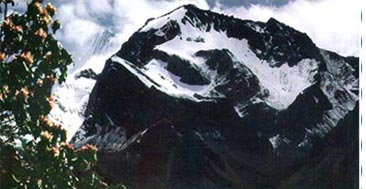1997 |
1998 | 1999 | 2000 | 2001 | 2002 | 2003 | 2004 | 2005 | 2006 | 2007 | 2008 | 2009 | 2010 | 2011 | 2012 | 2013 | 2014 | 2015| 2016| 2017| 2018| 2019| 2020 | 2021 | 2022| 2023| 2024
|
| Journal |
Himalayan and Central Asian Studies
|
(Quarterly being published regularly since 1997)
Editor : Prof. K. Warikoo
|
| |
| 2020 |
| |
| Vol. 24 No. 1 – 2 (January-June 2020) Xinjiang Special |
| |
|
|
|
| Editor’s Page |
|
1-2 |

Download
|
| Cultural Heritage of Xinjiang and Links with India |
Sunita Dwivedi |
3-27 |
| Kumārajīva: Philosopher and Seer |
Shashibala |
28-45 |
| Xinjiang in the System of Soviet-Chinese Relations, 1948-1949 |
V. Barmin |
46-69 |
| Uyghurs in Soviet Central Asia and their Transformation during Perestroika |
Ablet Kamalov |
70-90 |
| China’s Policy in Xinjiang: Comparison with Indian Experince in Kashmir |
K.Warikoo |
91-141 |
| Marginalized in their Homeland: Economic Discrimination Among Uyghurs in Xinjiang from 2000 to 2014 |
Henryk Szadziewiski |
142-156 |
| China’s Uyghur Policy in the post-Cold War period |
Mahesh Ranjan Debata |
157-171 |
| Xinjiang Studies and its Relevance in India |
Debasish Chaudhuri |
172-187 |
| Book Reviews |
|
|
| K. Warikoo, Xinjiang-China’s Northwest Frontier, London & New York: Routledge, 2016. 211 pp |
Mahesh Ranjan Debata |
188-191 |
| Mahesh Ranjan Debata, China’s Minorities: Ethnic-Religious Separatism in Xinjiang, New Delhi: Pentagon, 2007. 283 pp |
Debasish Nandy |
192-194 |
| Debasish Chaudhury, Xinjiang and the Chinese State: Violence in the Reform Era |
K. Warikoo |
195-198 |
| Tuva and Russia: 100 Years Together |
Chimiza K. Lamazhaa |
110-120 |
| The Tuvan People’s Republic and the USSR: History of Political Integration |
Marianna M.B. Kharunova |
121-127 |
| |
|
|
|
|
| Vol. 24 No. 3 (July-September 2020) Larichev Special |
| |
|
|
|
| Editor’s Page |
|
1-2 |

Download
|
| Vitaly Epiphanovich Larichev: The Orientalist, Archeologist, Astroarchaeologist |
V.N.Tuguzhekova |
3-16 |
| Petroglyphs of the Red Stone Sanctuary |
V.E. Larichev,
S.A. Parshikov and
E.G. Gienko |
17-45 |
| Great Salbyk Barrow – the biggest Megalithic monument in Siberia |
L.S. Marsadolov |
46-58 |
| In Memory of Professor Vitaly E. Larichev |
S.V. Alkin |
59-65 |
| The Emergence of ‘Early nomadic cultures’ in Eastern Steppe |
K.Matsumoto |
66-74 |
| Characteristics of Visual Art in the Late Bronze Age from North Asia to Europe |
O.V. Kovaleva |
75-84 |
| Religious Syncretism in Khakassia early Twentieth Century |
A.A. Burnakov |
85-88 |
| Emergence of Money Economy in Tuva at the turn of the Twentieth Century |
M.M.B. Kharunova |
89-96 |
| Khakassia and India: Historical and Cultural Linkages |
K. Warikoo |
97-104 |
| Transcending Stereotypes of Gender and National Identity: Dervla Murphy’s Siberia |
Sindhu Janardhan |
105-116 |
| |
|
|
|
|
| Vol. 24 No. 4 (Oct-Dec 2020) Baltistan Special |
| |
|
|
|
| Editor’s Page |
|
1-2 |
.jpg)
Download
|
| Editor’s Page |
K.Warikoo |
1-3 |
| Indian Concerns in Gilgit-Baltistan |
K.Warikoo |
5-20 |
| Gilgit-Baltistan’s Statehood:Examining Prospects
And Implications |
Prateek Joshi |
35-50 |
| India-Pakistan Cross-Cultural Connectivity’: |
Zainab Akhtar |
51-65 |
HRCF File
Future Status of Gilgit-Baltistan |
|
66-70 |
Book Review
K.Warikoo (Editor), The Other Kashmir: Society, Culture and Politics in the Karakoram Himalayas
|
Ravinder Kaul |
71-79 |
| |
|
|
|
|
|
 |


